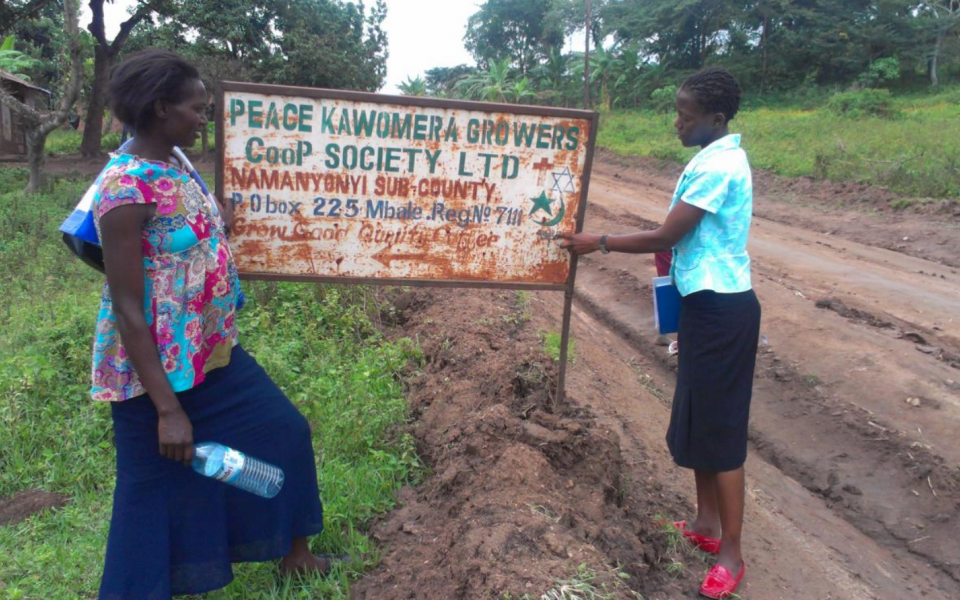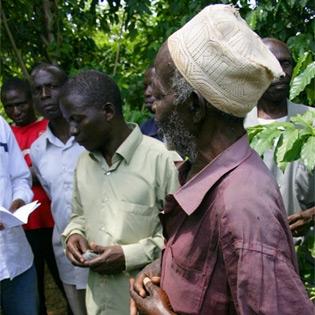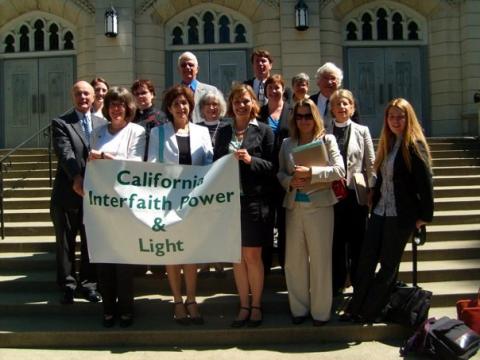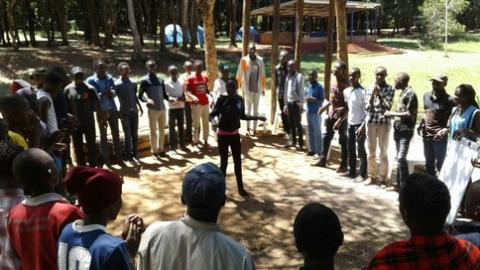
Peace Kawomera Cooperative Society Liaison Officer URI-GL May Nakyejwe (right) with Peace Kawomera staff
These three Cooperation Circles are engaged in work that not only brings together people of different faith backgrounds for peacebuilding, but also heals and protects the planet we all share. Since the shared earth under our feet is literally “common ground” between people of all religions and traditions, healing the environment is an extremely important topic in building bridges between all members of earth’s communities.
California Interfaith Power and Light, San Francisco, CA, USA.
California Interfaith Power and Light (CIPL) is a network of religious communities in California who are united to address Global Warming. These religious congregations do things like make energy and water conservation improvements to their houses of worship, install solar panels, hold training programs for other congregations, and lobby their state and local governments for stronger climate policies and investments in renewable energy. CIPL sees climate change as a problem that affects people of all faiths. The problem presents an important opportunity for people to bond together to solve it.
In 2014, the Peninsula Interfaith Climate Action (PICA), a regional working group of CIPL, group asked the Palo Alto City Council to send a message to the state employee pension fund requesting that they remove all of their investments in fossil fuels. And they were successful – in part because of the broad array of religious voices they were able to pull together!
“We bring people together by uniting them around a specific issue that affects us all. If more than 90 percent of scientists told the public, ‘Stop drinking water, it’s poisoning you,’ we wouldn’t say, ‘Oh that’s just a Baptist issue,’ or ‘That’s an Episcopalian issue’; we would all come together. And that is what we are calling for on this issue … I may believe in the Trinity and you may pray to Allah but that doesn’t mean we can’t learn to address this challenge together. Air pollution is air pollution, sea level rise is sea level rise, oceans without fish are oceans without fish– these matters have nothing to do with your race, class culture or religion.”
CLICK HERE TO READ THEIR FULL CC PROFILE
Peace Kawomera Cooperative Society CC, Mbale, Uganda
Peace Kawomera Cooperative Society Cooperation Circle works with Jewish, Muslim, and Christian farmers from diverse ethnic backgrounds. The Eastern part of Uganda enjoys relatively amicable relations between different faith communities, and Peace Kawomera works hard to ensure that those relations are deepened and sustained. The group cooperatively runs a coffee growing co-op where they train, employ, and buy coffee from community members of all different faiths. In addition to providing economic stability, they conduct trainings on interfaith dialogue, and encourage community members to participate in each other’s traditions.
The Cooperation Circle is currently concerned with planting more trees and growing forests, since their coffee thrives under the shade trees provide. Also, the project of constructing solar dryers will enhance the quality of exported coffee as well as help the process to become more efficient while still being environmentally-friendly.
“This year our efforts are geared towards strengthening relations among religions through community dialogues, conducting sensitization/training of members to produce quality coffee in order to secure the international market, as well as the construction of solar dryers.”
CLICK HERE TO READ THEIR FULL CC PROFILE
Undugu Family Hope Kibera, Nairobi, Kenya
Undugu Family Hope Kibera holds peace forums through dancing and sports, economic empowerment (through beadwork and garbage collection), and HIV/AIDS awareness initiatives. This Cooperation Circle is a youth-led effort that works with young Christians and Muslims in the Kibera community in Nairobi, Kenya. (“Udungu” means brotherhood in Swahili.)
Cooperation Circle members use their deep ties in the community to promote the message of cooperation and peace in schools and different Kibera neighborhoods. They primarily engage in environmental efforts: cleaning up their community and educating their peers on the importance of conserving the environment. They aim to lead by example, fostering relationships within their group as they spread a message of peace to those outside. On World Environment Day, the group engaged in an environmental cleanup exercise and created awareness on the need to keep the environment clean.




